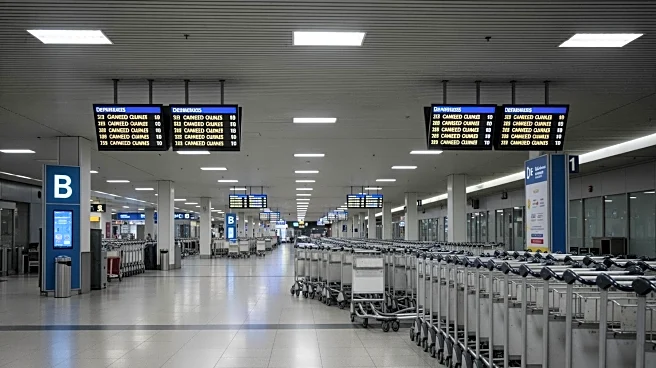What's Happening?
The ongoing government shutdown has led to significant disruptions in air travel across the United States, with more than 1,100 flights canceled on Sunday alone. This marks the third consecutive day of widespread travel disruptions, as reported by flight tracker
FlightAware. The shutdown, which is the longest in U.S. history, has particularly affected regional operator SkyWest, with 8 percent of its flights canceled. Major airlines like Delta and Southwest have also seen over 100 cancellations each. Airports such as Hartsfield-Jackson Atlanta International, the busiest in the country, have been severely impacted, with over 200 flights canceled. Other major airports in New York, Charlotte, Chicago, and Orlando are experiencing high numbers of cancellations and delays. The Federal Aviation Administration has ordered phased reductions at 40 high-traffic airports to alleviate the burden on air traffic controllers, many of whom are working unpaid overtime due to the shutdown.
Why It's Important?
The flight cancellations and delays are causing significant disruptions for travelers, particularly as the Thanksgiving holiday approaches. The reduction in flights and the strain on air traffic controllers could lead to further travel chaos, affecting millions of passengers. The situation highlights the broader impact of the government shutdown on essential services and the economy. Airlines are required to issue full refunds for canceled flights, but the inconvenience and potential safety concerns due to reduced staffing levels are causing anxiety among travelers. The shutdown has sparked political debate, with Senate Minority Leader Charles E. Schumer accusing Republicans of jeopardizing livelihoods by not resolving the impasse.
What's Next?
As the shutdown continues, further reductions in flights are expected, with a 6 percent decrease anticipated at numerous airports by Tuesday. The travel industry is bracing for more disruptions, especially with the upcoming Thanksgiving holiday, which traditionally sees a surge in travel. Political leaders may face increasing pressure to resolve the shutdown to prevent further economic and logistical fallout. Airlines and travel companies are likely to continue adjusting operations to manage the impact, while travelers may seek alternative transportation options, as indicated by Hertz's reported increase in one-way car rentals.
Beyond the Headlines
The government shutdown is not only affecting air travel but also highlighting the vulnerability of critical infrastructure and services during political stalemates. The reliance on unpaid overtime for air traffic controllers raises ethical concerns about labor practices and worker rights. The situation may prompt discussions on the need for contingency plans to protect essential services during government shutdowns, ensuring that public safety and economic stability are not compromised.
















